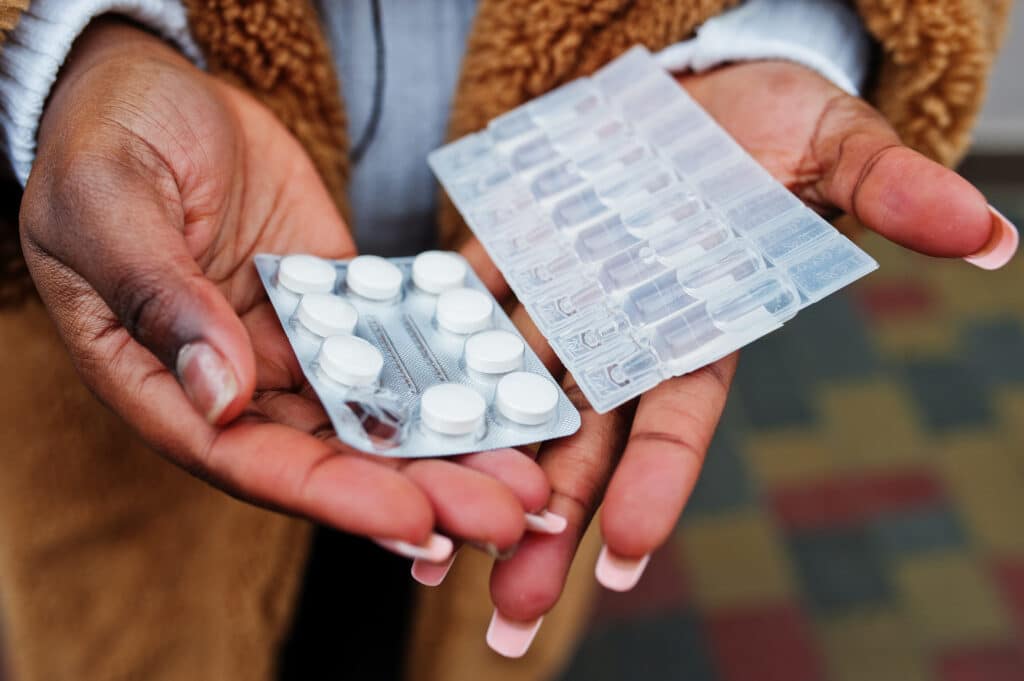Health Benefits Of Horse Chestnut Extract
Are you seeking natural remedies for vein health and inflammation? Horse chestnut extract, long cherished in traditional medicine, may offer various health benefits. This blog post will explore the science behind horse chestnut’s potential to alleviate venous issues, hemorrhoids, and cancer-fighting.
Keep reading to discover nature’s hidden gem for better well-being.
Key Takeaways
-
- Horse chestnut extract can ease leg swelling and pain from poor blood flow.
-
- The extract may help with varicose veins and hemorrhoids and has cancer-fighting bits.
-
- It might also lower blood sugar levels and fight swelling in the body.
-
- You should talk to a doctor before trying horse chestnut because it can have side effects or mess with your other meds.
-
- To use horse chestnut safely, pick good products, follow dose rules, and know the risks.
Benefits of Horse Chestnut Extract:
Horse chestnut extract offers numerous health benefits, including chronic venous insufficiency relief, varicose veins treatment, and anti-inflammatory effects. It also shows promise in relieving hemorrhoids and may contain cancer-fighting properties.
Relieves symptoms of chronic venous insufficiency
If you feel tired legs, swelling, or pain in your veins, horse chestnut seed extract might help. Studies show it can make chronic venous insufficiency (CVI) symptoms less severe.
CVI happens when your leg veins have difficulty sending blood back to your heart.
Taking horse chestnut extract may ease these problems and improve blood flow in your legs. This means less pain and swelling for people with CVI. The extract from this powerful tree works well for many who try it!
Treats varicose veins
Horse chestnut extract can be good for people with varicose veins. These are the swollen and twisted veins you can see under the skin. The main active part of horse chestnut, called aescin, improves blood flow in your legs.
This helps reduce swelling and the heavy feeling that comes with varicose veins. Many studies show that taking horse chestnut seed extract may make your legs feel better if you have this problem.
If someone has painful or itchy legs because of these bad veins, horse chestnut might help them feel less pain and itching. Talking to a healthcare provider before trying new things like this is important, especially if they already use other medicines.
Has anti-inflammatory properties
Horse chestnut extract is more than just a remedy for leg issues. It also fights inflammation, which can help with many kinds of swelling and pain in the body. The key ingredient in the extract is aescin, which research suggests could calm down inflamed areas.
This might mean less swelling and fewer aches for people who use it.
In studies on chronic venous insufficiency, patients saw their inflammation go down after taking horse chestnut seed extract. Their legs felt better because of this anti-inflammatory action.
So, if you struggle with swollen limbs or other inflammation-related discomfort, horse chestnut may offer some relief.
Relieves hemorrhoids
Horse chestnut extract can help relieve hemorrhoids due to its positive effects on veins. It has been shown that taking standardized horse chestnut seed extract orally may reduce the symptoms associated with poor blood circulation, including painful varicose veins and discomfort.
This natural remedy supports vein health, crucial in managing hemorrhoidal conditions and promoting overall comfort.
Furthermore, research suggests that horse chestnut extract has anti-inflammatory properties, which can also aid in soothing the discomfort and swelling often experienced with hemorrhoids.
Contains cancer-fighting compounds

Horse chestnut seed extract contains powerful antioxidants that may cause cell death in certain cancers. The natural product aescin in horse chestnut seed extract has been found to target cancer and stromal cells, offering potential cancer-fighting benefits.
These findings indicate the promising role of horse chestnut extract in supporting overall health and potentially combating certain types of cancer.
These compounds suggest that incorporating horse chestnut extract into one’s routine may offer additional health benefits beyond its primary uses. This information provides an intriguing insight into the potential impact of horse chestnut on our well-being, prompting further consideration for those seeking alternative or complementary approaches to their healthcare needs.
Other Potential Health Benefits:
In addition to the benefits for venous health, horse chestnut extract may also potentially affect male infertility and offer anti-inflammatory and hypoglycemic properties. Further exploring these potential health benefits can provide a comprehensive understanding of this natural remedy’s impact on overall well-being.
May improve male infertility
Horse chestnut extract may potentially improve male infertility associated with varicocele. Some studies suggest that it could help enhance sperm counts in men suffering from this type of infertility.
However, it’s important to note that research on horse chestnut seed extract for male infertility associated with varicocele is still limited, and more extensive studies are needed to establish its effectiveness definitively.
Possible anti-inflammatory and hypoglycemic effects
Research indicates that horse chestnut extract may have potential anti-inflammatory effects, beneficial for conditions like phlebitis and neuralgia. This herbal remedy is believed to contain compounds that could help reduce inflammation.
Additionally, studies suggest that the extract of Aesculus hippocastanum L. (horse chestnut) may also possess hypoglycemic effects, which could be useful in managing diabetes. These findings highlight the potential health benefits of incorporating horse chestnut extract into your wellness routine, particularly for individuals seeking natural remedies with anti-inflammatory and blood sugar-regulating properties.
Considering these potential anti-inflammatory and hypoglycemic effects, individuals looking to address inflammation-related conditions or manage blood glucose levels may find horse chestnut extract beneficial as a complementary approach to their healthcare regimen.
Safety and Precautions:
When using horse chestnut extract, knowing the potential side effects and interactions with medications is important. Understanding appropriate dosage recommendations and considering individual health factors is crucial for safe and effective use.
Possible side effects
Using horse chestnut seed extract can lead to potential side effects. It is important to be aware of the following possible side effects and risks before incorporating it into your routine:
- Itching, nausea, and gastrointestinal upset are common side effects that may occur.
- Muscle spasms and headaches can also be experienced after using horse chestnut seed extract.
- Long-term horse chestnut seed extract use should be cautiously approached due to potential adverse effects.
- Poisoning symptoms such as paralysis, coma, depression, and muscle twitching have been associated with horse chestnut seed extract.
- Consider potential side effects and risks before using horse chestnut seed extract, especially for individuals with pre-existing health conditions or sensitivities.
- Adverse effects should be monitored when using horse chestnut seed extract for treating varicose veins.
- Consult with a healthcare professional before using horse chestnut seed extract if there are concerns about potential side effects or interactions with other medications or supplements.
Interactions with medications

-
- Blood Thinners: Horse chestnut may increase the risk of bleeding when taken with blood-thinning medications such as warfarin or aspirin.
-
- Antiplatelet Drugs: Combining horse chestnut with antiplatelet drugs like clopidogrel can also elevate the risk of bleeding.
-
- Diabetes Medications: Horse chestnut might lower blood sugar levels, so it should be used cautiously with diabetes medications to avoid hypoglycemia.
-
- Immunosuppressants: Using horse chestnut alongside immunosuppressant drugs may interfere with the immune system’s function and effectiveness.
-
- High Blood Pressure Medications: Horse chestnuts can potentially affect blood pressure, so monitoring their use with hypertensive medications is essential.
Dosage recommendations
To incorporate horse chestnut extract into your routine, consider the following dosage recommendations before use:
-
- Consult a healthcare professional for specific dosage instructions and safety precautions, as limited information is available.
-
- Start with 300 mg of standardized horse chestnut seed extract by mouth to reduce symptoms of poor blood circulation like varicose veins, pain, and tiredness.
How to Incorporate Horse Chestnut Extract into Your Routine:
Choosing a quality brand and product is important when incorporating horse chestnut extract into your routine. Consider potential risks and factors, and follow recommended dosage and usage guidelines for safe and effective use.
Choosing a quality brand and product
Look for a high-quality horse chestnut supplement to ensure it’s effective and safe. Check for reputable brands that offer standardized extracts with the main active component, aescin.
Ensure the product undergoes testing for purity and potency to guarantee its quality. Avoid unprocessed forms of horse chestnut seeds, as they may contain toxic compounds harmful to your health.
When selecting a horse chestnut supplement, prioritize safety by choosing trusted brands with validated quality standards and transparent manufacturing processes. Look for standardized extracts containing aescin and check for third-party certifications confirming the product’s purity and potency.
Considering potential risks and factors
Before incorporating horse chestnut extract into your routine, you must be aware of potential risks and factors associated with its use. Horse chestnut extract may have side effects such as allergic reactions, itching or swelling, and possible interactions with certain medications.
It’s essential to consult a healthcare professional before using this supplement, especially if you have existing medical conditions or are taking other medications. Additionally, pregnant or breastfeeding women should exercise caution and seek medical advice before using horse chestnut extract.
When considering the benefits of horse chestnut extract, weighing them against the potential risks and factors involved in its use is important. Although this natural remedy offers various health advantages, such as alleviating chronic venous insufficiency symptoms and treating varicose veins, ensuring safety should be a priority.
Recommended dosage and usage guidelines
For adults, the recommended dosage of horse chestnut extract is 300-600 mg daily for 8-12 weeks. Sticking to these guidelines and not exceeding the recommended dose is essential.
Consulting with a healthcare professional is important before incorporating horse chestnut extract into your routine. Following the correct dosage and seeking guidance from a healthcare provider can help ensure horse chestnut extract’s safe and effective usage.
When using horse chestnut extract, it’s vital to prioritize safety by following the recommended dosage for adults, which ranges from 300-600 mg per day over an 8-12 week period. To incorporate this supplement wisely into your health regimen, seeking advice from a healthcare professional before use is crucial.
FAQs
Q: What are the health benefits of horse chestnut seed extract?
A: Horse chestnut seed extract is known for its various health benefits, including alleviating symptoms of chronic venous insufficiency, reducing leg pain, and supporting vein health.
Q: How can I use horse chestnuts for their health benefits?
A: You can use horse chestnut in various forms, such as capsules, tablets, or topical cream. Always follow the recommended product label dosage or consult a healthcare professional.
Q: What are the safety precautions and potential side effects of using horse chestnut?
A: While horse chestnut has numerous health benefits, it can also cause side effects such as nausea, itching, and gastrointestinal upset. It’s important to use it cautiously and under the guidance of a healthcare provider, especially if you have certain medical conditions or are taking other medications.
Q: What is the main active component in horse chestnut seed extract?
A: The main active component in horse chestnut seed extract is aescin, which is believed to have anti-inflammatory and vein-strengthening properties.
Q: Are there any specific health conditions for which horse chestnut seed extract is particularly beneficial?
A: Horse chestnut seed extract has been studied for its potential benefits in chronic venous insufficiency, varicocele-associated infertility, and reducing leg pain associated with vein issues.
Q: Can raw horse chestnut be consumed for its health benefits?
A: No, raw horse chestnut is not recommended as it contains a compound called esculin, which can be toxic when ingested in large quantities. Only processed forms of horse chestnut, such as extracts and supplements, should be used for health purposes.
Q: What are the properties of horse chestnut that make it beneficial for health?
A: Horse chestnut contains anti-inflammatory, antioxidant, and vein-strengthening properties, making it beneficial for improving venous circulation and reducing related symptoms.
Q: What are the known uses of horse chestnut beyond its traditional benefits?
A: Besides traditional uses, horse chestnut has been studied for its potential in addressing varicocele-associated infertility and as a dietary supplement for promoting vein health and overall well-being.
Q: Are there any risks associated with using horse chestnut for health purposes?
A: While horse chestnut offers numerous health benefits, it may pose risks, particularly in unprocessed forms. Always opt for standardized extracts and consult a healthcare professional to avoid potential adverse effects.
Q: What clinical evidence supports using horse chestnut seed extract for health benefits?
A: Randomized controlled trials and research studies have provided evidence of the efficacy of horse chestnut seed extract in addressing chronic venous insufficiency and related symptoms, further supporting its potential health benefits.

